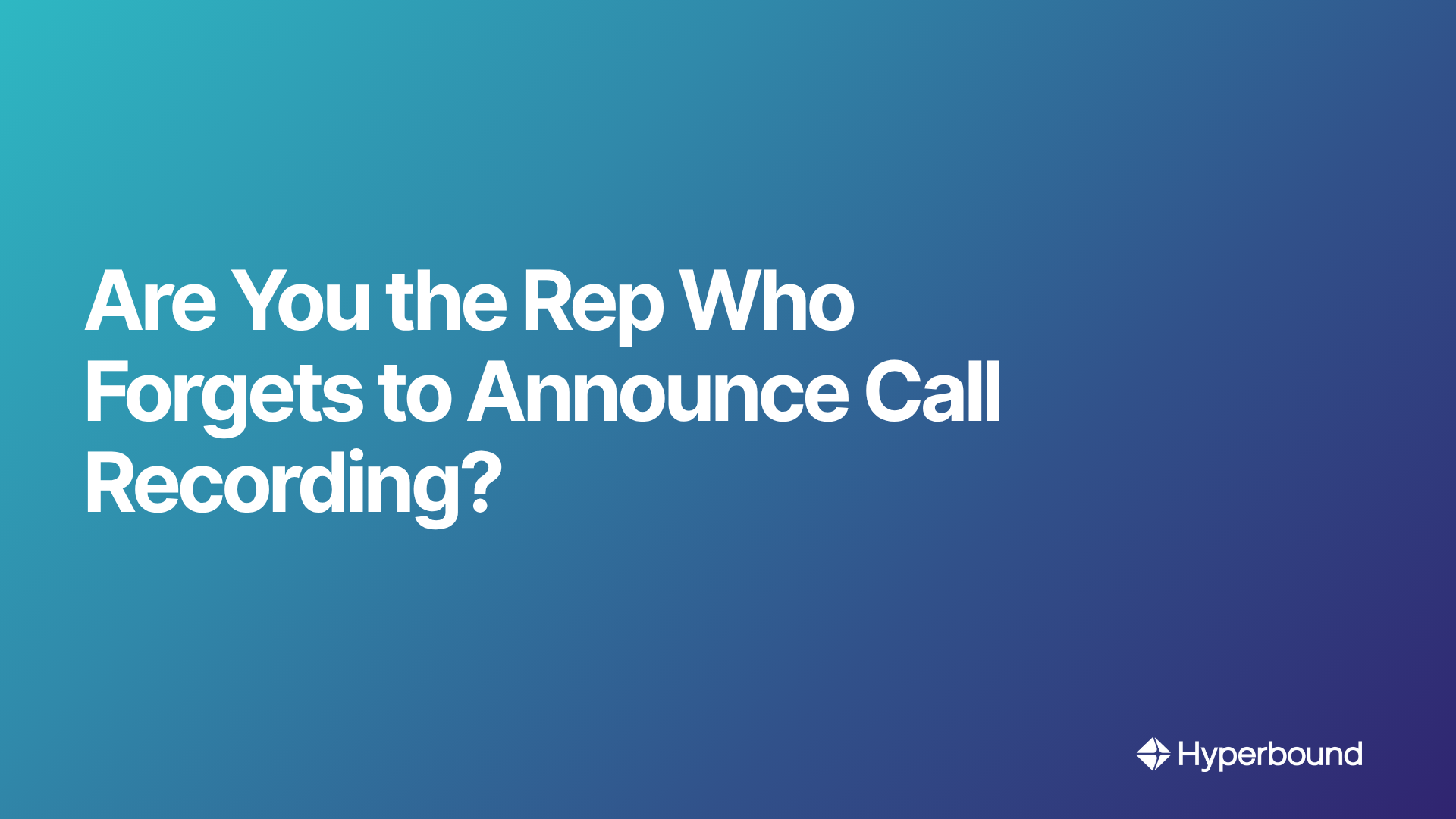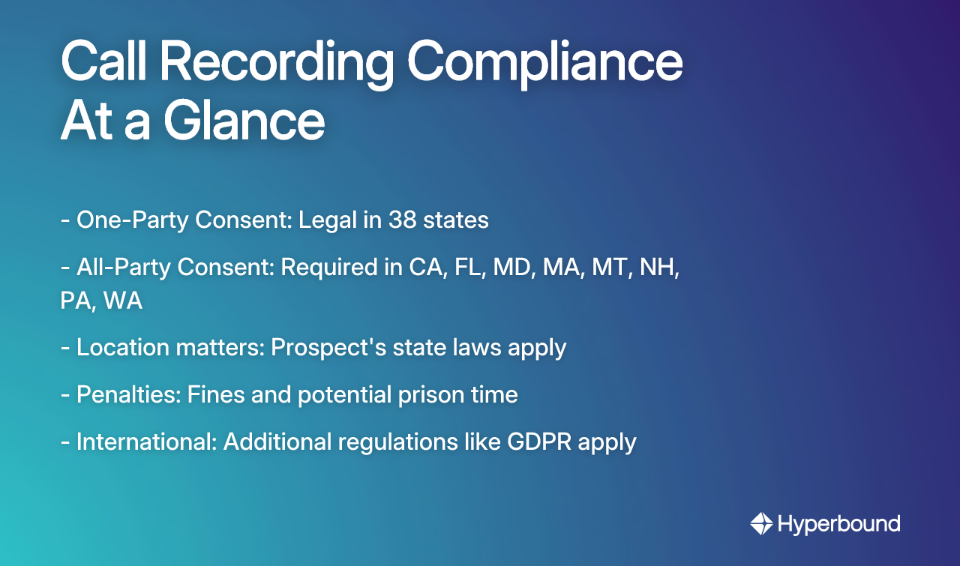
You've set up the perfect cold call. You've researched your prospect, practiced your pitch, and you're ready to make magic happen. Then that dreaded moment arrives—you need to announce you're on a recorded line. Your stomach tightens as you consider your options: say it quickly under your breath, "mumble-something-about-recording," or maybe just... forget to mention it entirely?
After all, as one sales rep put it, "Opening a call with 'this is being recorded' is a great way to never get an opp."
If this internal struggle sounds familiar, you're not alone. Across the B2B sales landscape, reps are making this silent gamble every day, weighing perceived conversion rates against murky compliance requirements.
The Silent Gamble: What's Really at Stake?
The math seems simple on the surface. You disclose the call recording, and the prospect might hang up. You don't disclose it, and the call flows naturally, potentially leading to an opportunity in your pipeline generation efforts. Many reps convince themselves the risk is minimal, especially when they feel pressure to hit their sales metrics.
"I'm sure conversion rates take a substantial hit when announcing 'calling on a recorded line'," shared one BDR on Reddit, capturing a sentiment echoed throughout sales floors from Fortune 100 companies to scrappy startups.
But this risk-reward calculation is dangerously flawed, and the stakes are far higher than most reps realize.
The Legal Minefield: A Quick Guide to Not Getting Sued

Call recording laws in the United States follow two main frameworks:
One-Party Consent States: In these states, only one person on the call (which can be you, the sales rep) needs to consent to the recording. This applies in 38 states.
All-Party Consent States: The remaining states require every person on the call to be notified and consent to recording. These states include California, Florida, Maryland, Massachusetts, Montana, New Hampshire, Pennsylvania, and Washington.
Here's the critical detail many reps miss: The governing law is typically based on the location of the prospect, not where you're calling from. This means if you're in Texas (a one-party consent state) but your prospect is in California (an all-party consent state), California's stricter laws apply.
The consequences? Violating federal wiretapping law can mean fines and up to five years in prison. At the state level, you could face criminal misdemeanors and costly civil lawsuits. If you're calling internationally, non-compliance with regulations like GDPR can lead to fines up to €20 million.
This isn't just theoretical. In 2021, a company paid a $500,000 settlement for recording sales calls without proper notification in California.
Fortune 100 vs. Startup: A Tale of Two Compliance Cultures
The approach to call recording compliance varies dramatically based on company size and maturity:
Fortune 100 Companies:
- Employ dedicated legal and compliance teams
- Maintain strict policies with regular training
- Utilize automated systems that play pre-recorded disclosure messages
- Prioritize protection of brand reputation over individual call performance
Startups and Smaller Companies:
- Often prioritize growth metrics over formal compliance processes
- May lack dedicated legal resources
- Frequently have inconsistent or non-existent recording policies
- Place the compliance burden (and risk) on individual reps
"Every company I have ever worked for just has software that stops the recording based on state laws," noted one rep from a larger organization. Meanwhile, startup reps often report being told to "just get it over with quickly" or even to deliberately downplay the disclosure.
This cultural gap creates a troubling dynamic where reps at smaller companies face the greatest personal liability while receiving the least institutional support.
How to Announce Recording Without Killing Your Vibe
The good news? You can remain compliant without torpedoing your calls. Here are field-tested approaches that maintain both legal compliance and conversion rates:
1. The Training Angle (for cold calls):"Hi [Name], this is [Your Name] from [Company]. Just so you know, I'm in training so this call is being recorded for quality assurance purposes. I was reaching out because..."
This approach humanizes you and often elicits empathy rather than suspicion. Many prospects actually appreciate the transparency and feel more comfortable knowing you're developing your skills.
2. The Upfront & Collaborative (for scheduled calls):"Do you mind if I record this call so I can focus on our conversation instead of taking notes?"
This framing presents the recording as a benefit to the prospect (your undivided attention) rather than a corporate requirement. According to call review data, this approach has a 99.5% approval rate.
3. The Simple & Direct:"Just so you know, this call IS being recorded."
Said confidently and followed immediately by value-driven conversation, this straightforward approach works surprisingly well. The key is not to sound apologetic or hesitant.
The delivery matters as much as the words. Don't trail off, mumble, or use an apologetic tone. State the disclosure confidently, then immediately pivot to your value proposition. Most prospects will barely register the disclosure if you don't make it sound like a big deal.

Technology Solutions: Let the Machines Handle It
Many companies are removing the human element entirely through technology:
- Automated Announcements: Many modern sales dialers and communication platforms can play a standardized message at the start of every call.
- Alert Tones: Some systems use a recurring beep tone that satisfies legal requirements without verbal interruption.
- Proactive Consent: Add disclaimers to web forms where prospects book calls: "By scheduling this call, you acknowledge it may be recorded for training purposes."
These approaches ensure 100% compliance while removing the burden from individual reps, addressing the common complaint that "we have no way on OpenPhone to put a message quickly to let the customer know the call is being recorded."
When and How to Push Back
What if your company has no clear policy—or worse, actively encourages you to "forget" the disclosure? As the person on the frontlines making the calls, you bear personal liability that your manager or company might not face. Here's when to push back:
Red Flags That Demand Action:
- No clear policy exists on call recording disclosure
- You're explicitly told to skip or minimize the disclosure
- Your company provides no technical solution for compliance
- You regularly call into all-party consent states without guidance
How to Push Back Constructively:

- Frame it as business protection, not personal preference:"I've been researching call recording laws, and I'm concerned we might be exposing the company to legal risk when calling into California. Could we clarify our official policy?"
- Propose a solution:"I've seen how AI coaching platforms like Hyperbound help teams practice and perfect their disclosure scripts. Could we look into implementing something similar to ensure our team is confident and compliant?"
- Request documentation:"Could I get our call recording policy in writing so I can make sure I'm following it correctly?"
If you receive pushback or vague responses, consider escalating to legal or compliance teams. Document your concerns and the responses you receive—this creates a paper trail showing you attempted to address compliance issues.
Reframing the Narrative: From Liability to Asset
The most successful reps don't view recording disclosures as obstacles—they see them as opportunities to demonstrate professionalism and build trust. After all, transparency at the start of a relationship sets the tone for honest communication throughout.
Call recording also provides invaluable benefits beyond compliance:
- Quality assurance for improving your sales techniques
- Detailed call reviews with your manager to refine your approach
- Protection against misunderstandings or disputed conversations
- Training materials to help new team members improve faster
The Bottom Line: Stop Gambling With Compliance
The momentary awkwardness of announcing a recorded line pales in comparison to the potential consequences of "forgetting." While it might feel like you're sacrificing conversion rates, the data suggests otherwise—prospects rarely object to professional, confident disclosure.
As sales processes become increasingly gamified through pipeline generation targets and aggressive sales metrics, it's easy to view compliance as an obstacle to hitting your numbers. But the most successful reps understand that long-term success requires building trust and maintaining professionalism.
So, are you the rep who "forgets" to announce call recording? If so, it's time to rethink that approach. The momentary discomfort of disclosure is nothing compared to the liability you shoulder by remaining silent.
Remember: It's not just about legal compliance—it's about starting every prospect relationship with transparency and trust. That's a sales strategy worth recording.
Frequently Asked Questions
Which US states require all-party consent for recording calls?
Several US states require all parties on a call to consent to being recorded. These states currently include California, Florida, Maryland, Massachusetts, Montana, New Hampshire, Pennsylvania, and Washington. It's crucial to always verify the most current laws as they can change. The remaining 38 states are generally considered "one-party consent" states, where only your consent is needed.
Which call recording law applies: my state's or my prospect's?
The law that applies is typically based on the physical location of your prospect, not your own. This is a critical detail that many sales professionals overlook. For example, if you are calling from a one-party consent state like Texas to a prospect in an all-party consent state like California, you must follow California's stricter laws and get consent from everyone on the call.
What are the penalties for not announcing a recorded call?
Failing to properly disclose a recorded call can lead to severe legal and financial penalties for both you and your company. Consequences can include significant fines, civil lawsuits, and even potential prison time for violating federal wiretapping laws. Internationally, non-compliance with regulations like GDPR can result in fines up to €20 million.
What is the best way to inform a customer the call is being recorded?
The best way to announce a recording is to be confident, direct, and immediately pivot to your value proposition. Instead of mumbling or sounding apologetic, state it clearly. For cold calls, use a "training angle" (e.g., "This call is recorded for training purposes"). For scheduled calls, frame it as a benefit (e.g., "Do you mind if I record so I can focus on our conversation?").
Do I need an explicit 'yes' for consent, or is announcing it enough?
In all-party consent states, you need clear consent from everyone, and continuing the conversation after the disclosure is generally considered implied consent. While a verbal "yes" is the safest option, the legal standard often accepts implied consent. This means if you clearly state the call is being recorded and the other person continues to speak, their consent is implied. However, if they object, you must stop recording immediately.
What should I do if my company doesn't have a clear call recording policy?
If your company lacks a clear policy, you should proactively raise the issue to protect yourself and the business from legal risk. Frame your concerns around business protection and request a formal, written policy from management or HR. Proposing solutions, like automated disclosure messages, and documenting your efforts are crucial steps in protecting your personal liability.

Book a demo with Hyperbound
.png)













